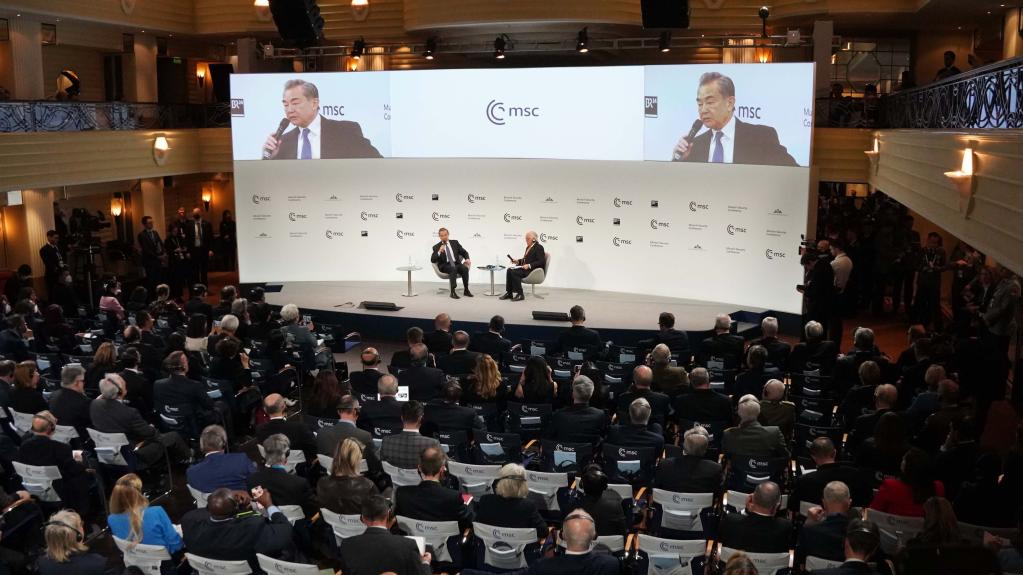
Wang Yi, director of the Office of the Foreign Affairs Commission of the Communist Party of China Central Committee, answers questions at the Munich Security Conference in Munich, Germany, February 18, 2023. [Photo/Xinhua]
By Mohannad Dlykan
On February 18, Wang Yi, director of the Office of the Foreign Affairs Commission of the Communist Party of China Central Committee, while attending the Munich Security Conference in Germany, said that China would publish a document outlining its "position on the political settlement of the Ukraine crisis."
On February 21, the Chinese Ministry of Foreign Affairs published another important document entitled "The Global Security Initiative Concept Paper."
Contemplating the aforementioned statement and document, prompts one to think that China is opening the door towards a new comprehensive approach to global peace and security. Additionally, it shows that China is seeking to not only push towards peacefully ending the conflict in Ukraine, but perhaps more importantly, it seeks to turn it into a new example of how to work to achieve peace on a global level.
As is known, China's position of calling for a peaceful resolution of the conflict in Ukraine through dialogue is not new, but rather it has been the same since the outbreak of the conflict and even before it. China is not the first to offer assistance to achieve peace in Ukraine, but this call seems to be different from previous mediation efforts.
The Türkiye and KSA-UAE efforts
Mediation efforts that led to actual results, albeit minor, include those sponsored by Türkiye, the Kingdom of Saudi Arabia (KSA) and United Arab Emirates (UAE). The Turkish mediation led to reaching the grains deal in July 2022. The KSA-UAE mediation led to exchange of prisoners between Russia and Ukraine.
Many political analysts agree that Türkiye, the KSA, and the UAE, because of the major global transformations taking place, are currently in a delicate position. For over 50 years, these countries were in the "Western camp" during the Cold War and remained close with U.S. thereafter.
Nonetheless, since the beginning of this millennium and more so during its second decade, they began to build strong relations with both China and Russia, both of which the West considers a threat.
However, these countries playing a mediation role can be interpreted not so much as being related to Ukraine itself, but as a desire to declare not taking sides, and to make it clear that they do not want to submit to Western intimidation that is trying to force them to take the Western side. In this sense, their pursuit of a mediating role can be understood as a defense mechanism, rather than a comprehensive plan to solving the Ukraine issue.
A battle for peace
For China, the case is different.
Since the conflict in Ukraine started, the West – particularly the U.S. – has sought to use temptation and intimidation tactics with China, including threatening with sanctions. Among the clear goals of these tactics is the attempt to weaken the strategic cooperation between China and Russia, as well as using the Ukraine issue as a pretext to intensify the U.S.'s targeting of China.
More importantly, based on self-belief in its exceptionalism and global role, the U.S. believes it has the right to draw the lines among countries, and decide who stands with whom and against whom. In other words, the U.S. seeks, through pressuring China, to push it to one of two extreme positions: either to submit, and the U.S. is perfectly aware that this is impossible; or to stand on the frontline with Russia based on how the U.S. had already designed the battlefield.
China, with its global efforts, seeks to redraw the global conflict stage differently from the Western mass destruction mentality. The Chinese efforts are based on the fact that there can be "us and you," which requires a new agreement or rather a new world order based on multipolarity, mutual respect, and parity.
Consequently, one can understand the simultaneousness of the Chinese initiative on Ukraine and "The Global Security Initiative Concept Paper." In this sense, China is fighting to change the West-designed global conflict coordinates, which are those of continuous crises.
Historically, retreating powers lean toward wars and rising powers toward peace. However, what is new in this era is that war has become more brutal and threatening to humanity's existence, and peace has become more crucial. Thus, China's efforts for peace and security should be embraced and supported by the world's countries and peoples.
Mohannad Dlykan is a Syrian journalist and the Council Secretary of People's Will Party in Syria.

 中文
中文



